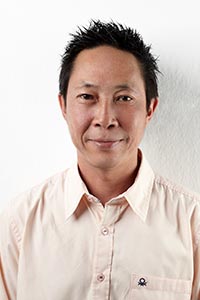
A sickness is pervading the Public Health Ministry. However, it is not exactly in a coma and there are signs indicating a recovery. But the extent of the malaise was underlined last Wednesday.
On that day the Rural Doctors Society handed a letter to Yingluck Shinawatra through Public Health Minister Pradit Sinthawanarong. It demanded the prime minister excise the man who received the letter.
The tactic deployed by the doctors who work at remote hospitals showed no mercy and sent a strong message to Dr Pradit and the premier that they have no desire to work with him anymore.
The rift between the rural doctors and Dr Pradit and public health administrators, including permanent secretary Narong Sahamethepat, goes beyond the policy change on monthly hardship allowances.
The doctors, who wore black when presenting the letter, staunchly oppose the policy of incentive-based performance instead of using the areas where they work as a payment guideline.
At present, physicians receive between 10,000 baht and 70,000 baht a month in addition to their salary depending on where they work. The deeper the hardship, the higher the allowance. Fair enough.
Rural doctors leave behind a comfortable life in the cities to work upcountry because of a commitment to improve health service for the rural poor. They are a small fraction of the country's doctors - only 3,000 out of 44,000 physicians - and work in provinces and districts at the far borders or in violence-prone areas. But it's not just goodwill that keeps them there. They are still human and need encouragement to stay put in small, struggling hospitals, and that comes in the form of hardship incentives. Until now they have been happy with that.
But Dr Pradit and the ministry are thinking differently. They believe the doctors should receive additional payments based on their performance rather than location. Better health conditions at their hospitals will be a deciding factor in the extra recompense.
That sounds like a performance-based bonus usually applicable to the business sector. The problem is, health productivity, unlike economic or industrial productivity, is difficult to quantify as it takes months or even years to see the fruit of their labours as many factors have to be taken into account. Clearly, it does not make sense to apply a business model to these doctors.
Thus the rural doctors sense a hidden agenda to this policy. They feel it might be cleverly designed to discourage doctors from going to rural areas by withdrawing the automatic financial incentive for hardship postings. With no guaranteed fixed payments, new and veteran rural doctors will think twice about working in less salubrious surroundings. Society president Dr Kriangsak Watcharanukulkiat warned of a ''brain drain'' from remote locations.
Who will benefit from this change? A suspected target is private hospitals. They are growing fast and the quick expansion has lead to a shortage of physicians to cope with rising demand. Privately-run hospitals are expanding from Bangkok and other big cities into the provinces and even districts. A ''brain drain'' scenario could fit the plans of doctors who want to work in the provinces but will not accept a performance-based incentive.
Rural doctors have little faith in the Pheu Thai government. They have long suspected political interference through efforts to send or try to send certain nominees to sit on agencies like the Thailand Health Promotion Foundation, the National Health Security Office and the Emergency Medical Institution of Thailand, which enables these people to reap the benefits of huge budgets while dictating to them for political purposes.
The protest at the ministry last week was just the latest move to underline their widening suspicion of the government. Dr Pradit, however, showed no sign of backing off from their call to reconsider performance-based incentives. He remains adamant that the change is enough to encourage them to improve health conditions in their localities. But there would be a price to pay.
The real victims of this conflict are not rural doctors. Those unhappy with the new payment system can easily find a better place to work or take up positions in a private hospital. Not so the villagers and patients they attend to. They cannot move around like them. They are stuck where they are and will bear the cost of this policy.
It certainly won't be Dr Pradit and public health administrators who let rural doctors leave instead of paying them fairly.
Saritdet Marukatat is Digital Media News Editor, Bangkok Post.
